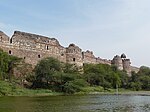Pragati Maidan railway station
Delhi railway divisionDelhi railway station stubsPages with no open date in Infobox stationRailway stations in New Delhi districtUse Indian English from December 2017

Pragati Maidan railway station is a small railway station in Pragati Maidan which is a residential and commercial neighborhood of the New Delhi district of Delhi. Its code is PGMD. The station is part of Delhi Suburban Railway. The station consist of 2 platforms.
Excerpt from the Wikipedia article Pragati Maidan railway station (License: CC BY-SA 3.0, Authors, Images).Pragati Maidan railway station
Mahatma Gandhi Marg, Delhi
Geographical coordinates (GPS) Address Nearby Places Show on map
Geographical coordinates (GPS)
| Latitude | Longitude |
|---|---|
| N 28.6155 ° | E 77.2474 ° |
Address
Pragati Maidan
Mahatma Gandhi Marg
110013 Delhi (Chanakya Puri Tehsil)
Delhi, India
Open on Google Maps







